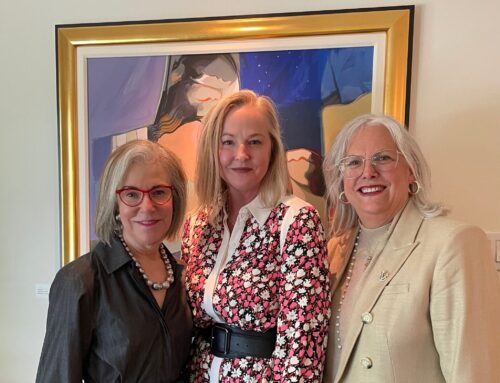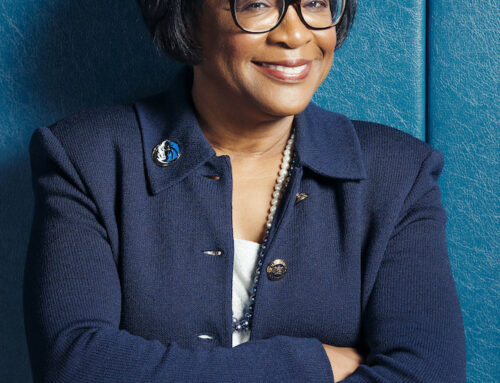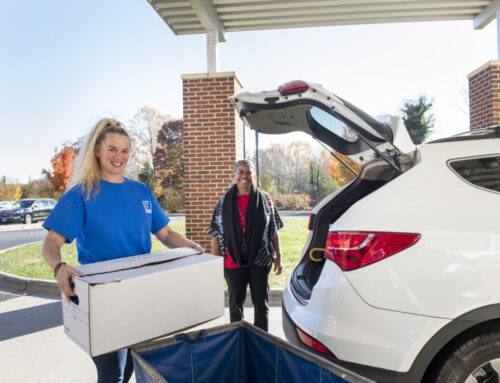They come from different backgrounds, different decades and different branches of the military, but the veterans profiled in this story share a taste for adventure and a love of this country. Though nothing about their service during wartime was easy, they all say it impacted their lives in profound and positive ways. Here, they share tales of love, combat and life in Preston Hollow.
From Somalia to Iraq
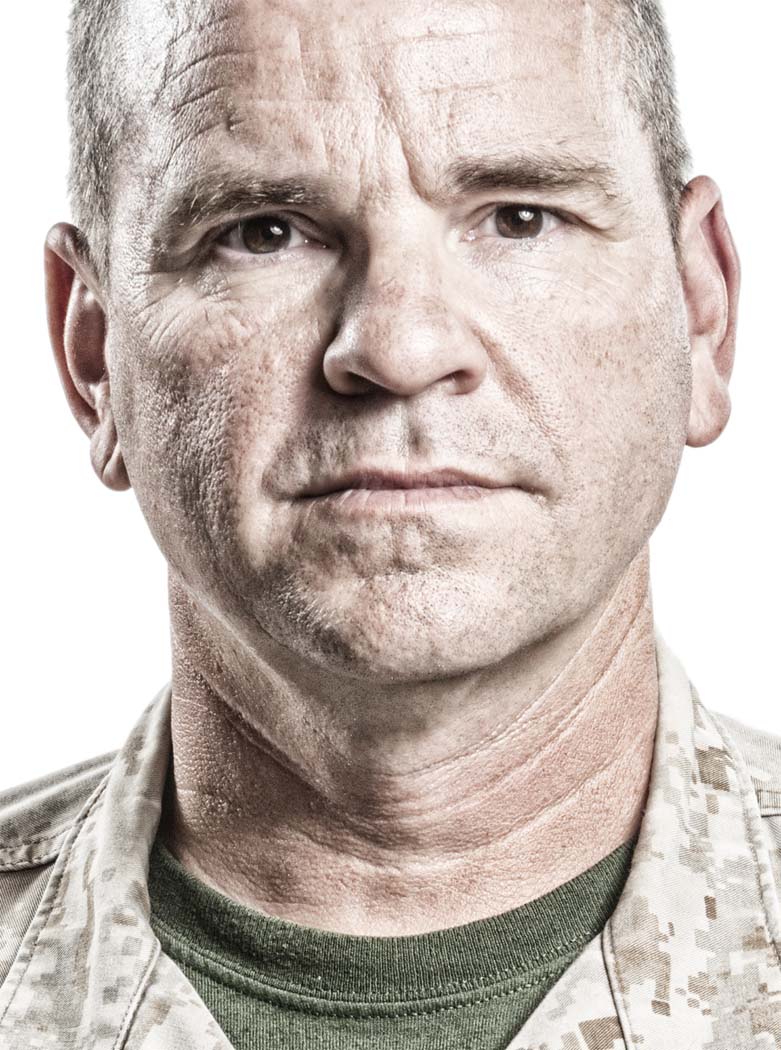
Marine Lt. Colonel Jeffrey Hauser (ret.) poses for a portrait at WT White High School in Dallas, TX on Sept. 29, 2015. Hauser served as an intelligence officer in various areas of operation, including Somalia, Afghanistan and Iraq. He went on to become an ROTC instructor. Photo by Danny Fulgencio
Lt. Col. Jeffrey Hauser’s call sign was “Doogie,” after the fictional teenage doctor played by Neil Patrick Harris.
“Let’s face it, I don’t look like a Marine,” he says. “I have a baby face. It was more of a baby face then because there was less gray hair.”
When Hauser first enlisted, he practically was a baby. Only 17 years old, he needed parental permission to start basic training in 1984. The military life suited him, so he decided to enroll in an officer-commissioning program. Upon graduation, he became a second lieutenant for the United States Marine Corps. He calls it “a fluke” that he was deployed or in combat nearly his entire career.
His first assignment was in Somalia, where he served as an assault amphibian platoon commander during Operation Restore Hope, helping to establish a protective barrier for humanitarian work following the bloody civil war. It was a dangerous assignment to say the least. He and his fellow Marines were under attack almost daily.
“I had never seen combat before,” he says. “Having somebody shoot at me and shoot at people, that was something that — you know, I’m a liberal arts guy, so that was kind of a wild, eye-opening experience.”
Hauser was responsible for a platoon of 15 vehicles. Only a handful of them were needed for most patrols, so he could have sent out a staff sergeant and stayed on land, where he was safe. But that’s not how he operates.
“Since my guys were getting shot at all the time, I went on every patrol,” he explains. “If something happened, I wanted to be there.”
That sense of duty helped him climb the ranks. After his stint in Somalia, Hauser became an intelligence officer and was promoted to major. In 2001, he moved to Norfolk, Va., where he worked for the Joint Forces Intelligence Command. He was one of the first people to see American Airlines Flight 11 crash into the Twin Towers.
“I knew the world was changing at that point,” he says.
Hauser’s life changed along with it. When the United States invaded Iraq, Donald Rumsfeld appointed 28 senior officers from different Military Occupational Specialties to watch and document the war effort.
“I was one of those 28,” Hauser says. “I was the subject matter expert for intelligence and for information operations.”
He describes this tour as relatively peaceful, primarily because most of the Iraqis he encountered seemed comforted by the Marine Corps’ presence.
“There were a few holdouts that supported Saddam,” he admits. “But until November 2003 it was pretty quiet in Iraq.”
[quote align=”right” color=”#000000″]“It was the most dangerous of anything I’ve done, but at the same time the most satisfying. You felt like you were making a difference in everything you did.” [/quote]It was a different story in 2006. Hauser was stationed in Fallujah, “during the height of violence in the al-Anbar Province.” He was the principal staff officer for intelligence, counterintelligence and security. As such, he was involved in many classified missions, the details of which he can’t divulge.“It was the most dangerous of anything I’ve done, but at the same time the most satisfying,” he remembers. “You felt like you were making a difference in everything you did.”
To relax, he read poetry by Rudyard Kipling and wrote letters. That’s how he met his wife, Kerry, who was in Officer Candidate School at the Army base in Fort Benning.
“Her mom and my mom met on like, eDiets, a support group thing,” he explains. “Both of them are very religious and very outgoing, so my mom is like, ‘My son is in Iraq, you should send him a letter.’”
Kerry’s mother did just that. In her initial note, she asked that he reach out to her daughter and provide a few words of encouragement to help her through training. Hauser obliged.
“The subject line was ‘Please don’t delete this, your mom wants me to send it,’” he says, laughing. “I think I fell in love with her after the third email.”
Due to an injury, Kerry left the armed forces but remained supportive of her husband’s career. She moved anywhere he was stationed, but dreamed of living in Dallas, where she had attended college. In August 2014, after 27 years of service, Hauser retired.
“My wife wanted to come back to this area,” he explains. “I’m all about supporting her, because I’ve had my career.”
He now works at W.T. White, as the JROTC’s senior marine instructor. Hauser loves interacting with students and is completing a doctorate in education leadership. He’s also working on his principal certification and hopes to get a district superintendent license. But his career in the armed services will be hard to beat.
“I watched a lot of John Wayne movies when I was growing up,” he says. “And I’m an avid reader, so I had this kind of … romance of the military — the hardship and everything else, the shared pain — and for me, it was that way.”
Memories of Vietnam
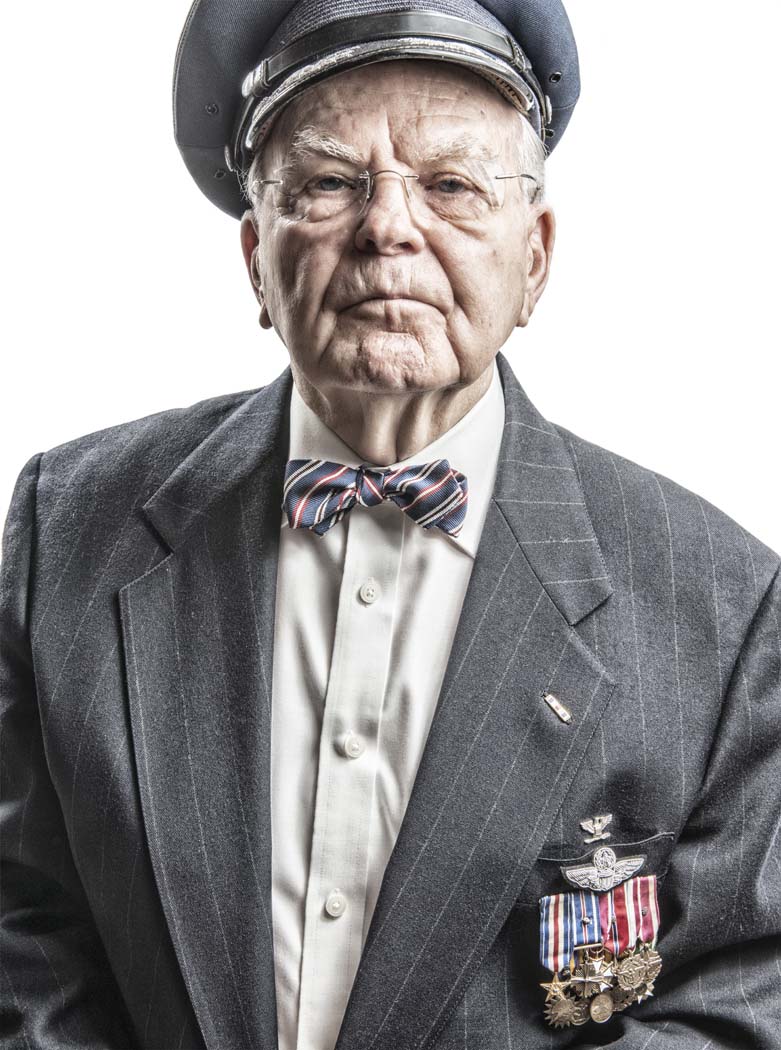
Colonel James Gilliland (ret.) poses for a portrait at the Edgemere Retirement Community in Dallas, TX on the Oct. 1, 2015. Gilliland, who completed 100 Air Force missions over Vietnam, later served as a commander in multiple roles within the US Air Force. He earned the Air Medal, Silver Star, Legion of Merit, Fly Cross and a Bronze Star for his actions. Photo by Danny Fulgencio
Preston Hollow resident Col. James Gilliland has an office full of awards and a box brimming with medals. Perhaps his most prestigious decoration is the Silver Star, which he earned for his service in Vietnam. As part of the 11th Tactical Reconnaissance Squadron, he flew an RF-4C over the northern part of the country. He was charged with photographing the destruction about 10 minutes after each air raid.
“We had no weapons,” he says. “We were unarmed … We’d brief ourselves on what we would do if one [of us] was shot down.”
In addition to these missions, Gilliland was involved in a then highly classified attempt by the U.S. government to induce rain in Southeast Asia.
“I was controlling the weather,” he explains. “I would take pictures of the flooding and I was seeding the clouds.”
Back home, his wife, Neva, cared for their four children.
“We’d just get letters once in a while,” she says. “We just had to spend a lot of time praying on our knees and just getting through each day and trusting that the Lord would take care of him.”
Gilliland knew his time in Vietnam would be perilous. Before his deployment, he underwent intensive prisoner of war training in Nevada.
“They treated us like we were prisoners,” he remembers. “They had men that were dressed as if they were the enemy and they gave us — I think it was 2 pounds of meat, two potatoes, just a few things … so we had to scavenge for our food.”
Because he was “the little guy” and “could get low enough in the sage brush,” Gilliland was chosen to “escape.” The desert dust dirtied his uniform and hurt his eyes, so he found an empty barracks. There, he took a shower, dried off with a bed sheet and called a friend to pick him up.
“If you had escaped, you had to be back at a certain time,” he explains.
[quote align=”right” color=”#000000″]“We had no weapons. We were unarmed … We’d brief ourselves on what we would do if one [of us] was shot down.”[/quote]Gilliland hopped in his friend’s trunk and they sped toward the POW camp, where the headquarters people were.“[My friend] opened the trunk, so I got out and ran in,” Gilliand says, sounding surprised and amused that they pulled it off.
North Vietnam was so dangerous, the Air Force typically sent pilots home after their 100th mission. But, at the end of his combat tour, Gilliland was sent to Saigon, where he found himself in the midst of the Tet Offensive. He says the extreme violence he witnessed there is difficult to discuss.
When he finally returned to the States, Gilliland completed his master’s degree in management and then moved to Honolulu where he worked at Hickam Air Force Base. In 1972 he returned to Thailand and helped “establish a new satellite tracking facility for North American Aerospace Defense Command’s (NORAD) world surveillance system.” Eventually, he and his family moved to England. He worked first in Oxford, as the Deputy Base Commander of the 20th Fighter Wing, and then in London, helping the United States close down operations at the Royal Air Force base. Ironically, it was in the United Kingdom that Gilliland had his most memorable Fourth of July.
“Neva and I went to the event early because they were going to have dignitaries there, and so forth,” he remembers. “I must have been looking down or something, because I saw black shoes in front of me. I looked up and it was Jimmy Stewart. He said, ‘Move over.’ He wanted to sit between us.”
After three decades of harrowing flights and run-ins with movie stars, Gilliland retired. But the colonel remains an active member of our community. For years, he was part of the Institute Review Board at Presbyterian Hospital and sat on the Preston Hollow Neighborhood Association’s board of directors. He now chairs the wellness committee at Edgemere senior living and enjoys relaxing with Neva, who is glad to finally have him settled at home.
“We just live,” she says. “We just live together.”
The First waves
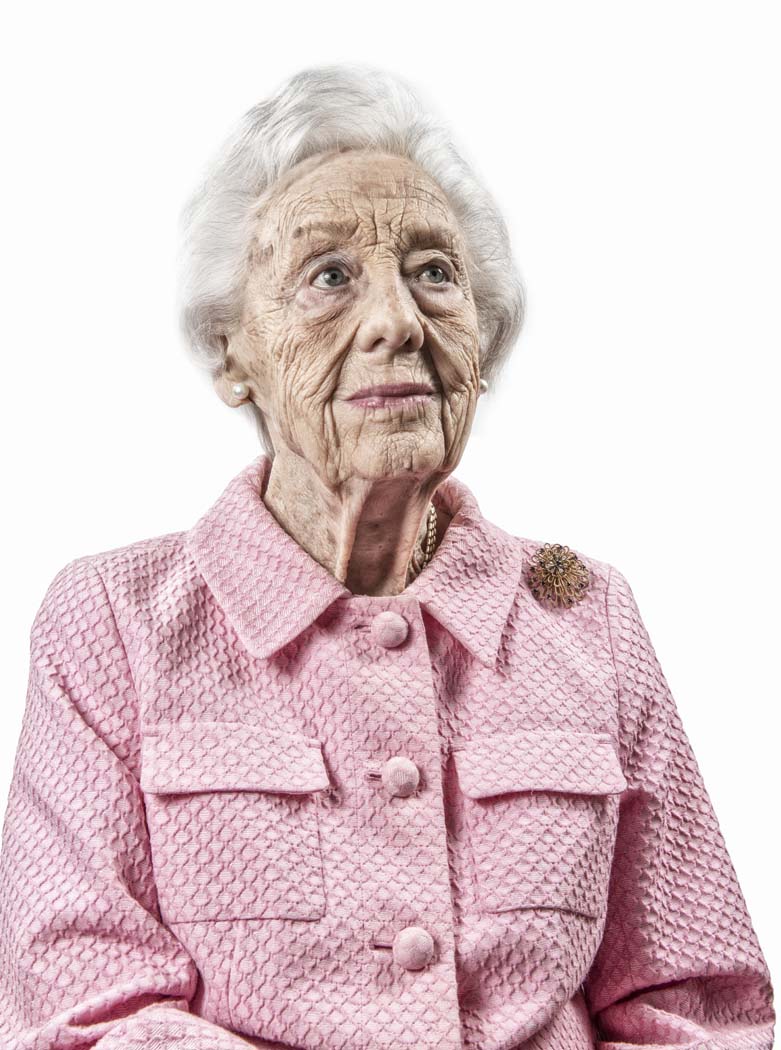
Mrs. Chevie McDonald poses for a portrait at the Edgemere Retirement Community in Dallas, TX on Oct. 1, 2015. At the outbreak of WWII, McDonald was a merchandise buyer for Macy’s. She then graduated from the first class of WAVES, Women Appointed for Voluntary Emergency Services. For over two years she helped break code for the US military. Photo by Danny Fulgencio
It’s hard to believe Lorraine Chevalier “Chevie” McDonald is 95 years old — she flits about her apartment at Edgemere senior living like it’s a college dorm. But she graduated from the University of Pennsylvania in 1940, with a degree in political science and was working as an assistant buyer for Macy’s when Pearl Harbor was attacked.
“I was insulted, the way everyone else was, that the Japanese would do that,” she says. “I wanted to do something.”
As a woman, her options were limited. She could have become a nurse or entered the Women’s Army Corps, but McDonald had her sights set on the Navy.
“I had a lot of friends in the Navy — boys,” she explains. “One special friend of mine was at Pearl Harbor.”
Luckily, in 1942, thanks in large part to the efforts of Sen. Margaret Smith, Congress passed a piece of legislation, authorizing Women Appointed for Volunteer Emergency Service (WAVES), an all female division of the U.S. Naval Reserve.
“I was determined to go in the first class,” McDonald says, emphasizing the word “determined.”
But enrolling in the Officer Commissioning Program wasn’t easy. Applicants were required to have a letter of availability from their employers and McDonald’s boss didn’t want to cooperate.
“I got a letter [from the president of Macy’s], saying I was unavailable because all the boys were leaving, and they didn’t want everything to be left vacant,” she explains.
Despite this setback, she set up an interview in New York with a recently sworn in female officer. McDonald showed her the disappointing letter, which turned out to be a great decision.
[quote align=”right” color=”#000000″]“I was insulted, the way everyone else was, that the Japanese would do that. I wanted to do something.” [/quote]“She said, ‘Oh, I know [your boss] very well — I was head of human resources for Macy’s’,” McDonald remembers. “She took the letter and ripped it up and I was in, so I was very happy.”For training, McDonald went to Smith College in Northampton, Mass. It was winter and she remembers being cold, especially in the mornings. The WAVES had to be in uniform and outside by 6:30 a.m. They studied “all kinds of things” — naval history, military protocol, airplane and ship identification.
“We had to take typing,” she says. “We had all come from good jobs. We had had people type for us and we thought, ‘This is awful. What are we going to do? Then we found out they needed communications officers … We were coders and incoders of Navy secret messages. We had to put the open messages into code and then the ones that came in from all over the world we had to decode.”
For McDonald and many of her cohorts, this coding and incoding took place behind locked doors in New York City. In the Big Apple, she says the WAVES were “an oddity” but largely well received. However, some of her male counterparts made wisecracks.
“Sometimes they’d say something about, ‘You’re taking my cushy desk job’,” she says. Her response? “‘Oh, and aren’t you happy that you’re going out to sea?’”
While living in the Village, McDonald began dating her husband, Bob, who was also in the Navy. She had known him in college but didn’t consider him a viable partner then because he was a bad dancer. Somehow, he won her over and they were married at Saint Patrick’s Cathedral. Two years into her service, she became pregnant with their first daughter and had to leave the WAVES. Her departure from military service was bittersweet.
“I was delighted that I was going to have a baby,” she says. “I thought that was exciting. Also, it was exciting because my husband got orders to go to Guantanamo Bay in Cuba and the baby and I were the first civilians to go on a ship out of New York after [Victory over Japan] Day.”
McDonald loved Cuba. Their house was large and had a beautiful garden. She would have been happy to stay forever, but Bob left the Navy and took a job in New York at a food manufacturing company. Eventually, he got a better offer in Dallas, so they settled in Preston Hollow “because it was full of trees.” She enrolled her 8-year-old daughter at Ursuline and her 11-year-old son at St. Marks — her two eldest children were already in college.
Though they were separated by distance, McDonald and her fellow WAVES remained close friends.
“I guess we were all in this together,” she says. “We had a single purpose. We really were bonded.”


